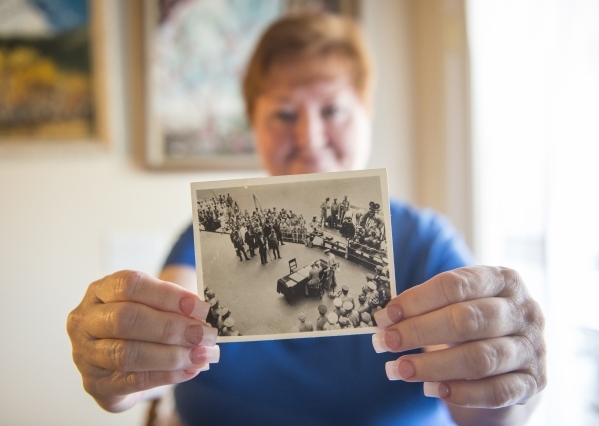On 70th anniversary, North Las Vegan recalls dad’s stories of WWII’s end

“Today the guns are silent. A great tragedy has ended. A great victory has been won. The skies no longer rain death. … The entire world is quietly at peace.”
Those were the words of Gen. Douglas MacArthur, 70 years ago on Sept. 2, 1945, as he spoke in his worldwide radio address from Tokyo Bay on the deck of the USS Missouri after Japan’s Foreign Minister Mamoru Shigemitsu signed the formal surrender ending World War II.
That day has special meaning for Barbara Ackerson, of North Las Vegas.
Her father, B-29 “Poison Ivy” Superfortress pilot 1st Lt. Donel Marsh, was on a gun turret behind MacArthur, snapping photos of the historic scene with the khaki-uniformed Supreme Allied Commander facing the Japanese delegation clad in black formal attire, complete with stovepipe hats.
The 21-year-old Army Air Corps soldier from Sioux Falls, S.D., was in prone position, trying to hold his camera steady “and trying not to fall off,” Ackerson said Tuesday, recalling her dad’s war story from when she was a little girl.
To him, “it was the end of horrors and the end of war,” she said. “He didn’t speak about the happenings of war.”
Those images remain in her father’s once-classified photo collection of the fire-bombing strike on Osaka, Japan, on June 1, 1945, and the aftermath of the game-changer, the Aug. 6, 1945, atomic bombing of Hiroshima — “a point which revises the traditional concepts of war,” as MacArthur put it.
“The United States had to do what it had to do to make us safe,” said Ackerson, now 69.
Before her dad was discharged as an Air Force captain in the 1950s and went on to fly for Air America, she realized what the day Japan surrendered meant to her well-traveled military family: “That’s how we got our dad back.”
It also meant he could continue to do what he loved — flying.
“If they said he could fly to the moon, he would,” she said.
Her daughter, Dawn Neely, remembers her grandpa Marsh as a strong man who gave her a boost on her uncle’s wedding night in Clarinda, Iowa.
“He held me up on his shoulders to watch the fireworks and I could smell his pipe,” she said.
“I’m proud that he was there for that piece of history, for that moment in time when we became a superpower,” Neely said about her grandfather, who died in 1976.
Former longtime Las Vegas resident Leonard Gross survived the sinking of the USS Wasp after it was hit by two Japanese torpedoes on Sept. 15, 1942. With third-degree burns on his face, hands and back after floating for six hours in oil-soaked South Pacific waters, he was recovered but presumed dead until he threw up the oil he had swallowed.
He went on to be a communications officer for Pacific Fleet commander Adm. Chester Nimitz, who was also on the deck of the USS Missouri for the Japanese surrender. Meanwhile, Gross was in San Francisco when news of Japan’s unconditional surrender spread six days after the atomic bombing of Nagasaki, Japan.
“The whistles started blowing on San Francisco Bay. We figured something was going on,” the 94-year-old said, recalling the “wing ding” that he went to later with his wife, Miriam.
They caught a cross-country train to Philadelphia for his discharge when the war ended.
“How can you quantify it in words,” Gross said Tuesday. “It was a great, great day for the United States and a great day for the world. In the final context, a lot of time has passed and the Japanese are no longer our enemy.”
Contact Keith Rogers at krogers@reviewjournal.com or 702-383-0308. Find him on Twitter: @KeithRogers2.